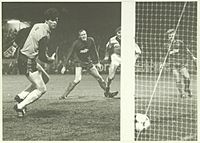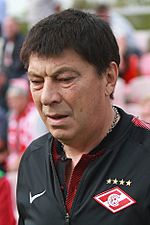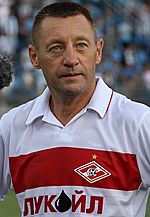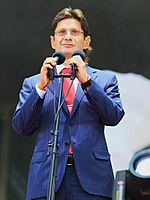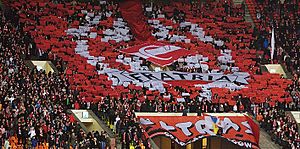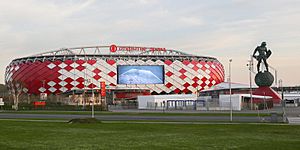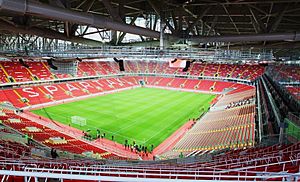FC Spartak Moscow facts for kids
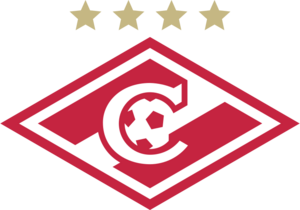 |
||||
| Full name | Футбольный клуб Спартак Москва (Football Club Spartak Moscow) |
|||
|---|---|---|---|---|
| Nickname(s) | Gladiatory (Gladiators) Narodnaya komanda (The People's Team) Krasno-Belye (Red-and-Whites) |
|||
| Founded | 18 April 1922 | |||
| Ground | Lukoil Arena | |||
| Capacity | 45,360 | |||
| Owner | Lukoil | |||
| Manager | Dejan Stanković | |||
| League | Russian Premier League | |||
| 2024–25 | Russian Premier League, 4th of 16 | |||
|
||||
FC Spartak Moscow (known in Russian as Футбольный клуб «Спартак» Москва) is a very famous football club from Moscow, Russia. They are one of the most successful football clubs in Russia. Spartak has won many championships in both the Soviet era and modern Russia. They've also won many national cups and reached the semi-finals of big European tournaments like the UEFA Europa League, UEFA Champions League and the UEFA Cup Winners' Cup.
Contents
Club History
How Spartak Moscow Started (1883–1941)
In the early days of Soviet football, different government groups like the police and army created their own football teams. These teams often showed off their power through sports wins. Spartak was different because it was started by a trade union. This made it known as "the people's team."
The club's roots go back to the Russian Gymnastics Society, founded in 1883. This group wanted to promote sports like football. In 1923, a team called Krasnaya Presnya was formed. It was led by Ivan Artemyev and included Nikolai Starostin, who was very important to the football team.
The team grew and even built its own stadium. In 1934, Nikolai Starostin and his brothers were asked to make the team even stronger. The team changed its name to "Spartak Moscow" in 1935. The name Spartak comes from Spartacus, a famous gladiator who led a rebellion in Ancient Rome.
The four Starostin brothers were key to the team's success. They played for Spartak in the 1930s. Later, Nikolai Starostin faced difficulties but said football helped him survive. He even returned to manage the team in 1954.
In 1936, the main Soviet football league began. Dynamo Moscow won the first championship, but Spartak won the second one that same year. Before World War II, Spartak won two more league titles.
Spartak Moscow After the War (1945–1991)
In the 1950s, Spartak and Dynamo were the top teams in the Soviet league. When the Soviet national team won gold at the 1956 Olympics, many players were from Spartak. Igor Netto, Spartak's captain, also captained the national team for many years.
Spartak won two more league titles in the 1960s. However, by the mid-1960s, they were not seen as a top club anymore. In 1976, Spartak even moved down to a lower league.
Even after being relegated, fans continued to support the team. Konstantin Beskov became the new coach. He brought in young players like Rinat Dasayev and Georgi Yartsev. Spartak quickly returned to the top league and won the title in 1979.
A sad event happened on October 20, 1982, during a UEFA Cup match between Spartak and Dutch club HFC Haarlem. Many people were hurt in a crowd crush at the stadium.
In 1989, Spartak won its last USSR Championship. Their striker Valery Shmarov scored a winning free kick right at the end of the game. The next season, Spartak reached the semi-finals of the European Cup. They beat strong teams like Napoli and Real Madrid but lost to Marseille.
Modern Spartak Moscow (1991–Present)
Early Success in Russia (1991–2004)
After the Soviet Union ended, a new Russian league started. Spartak, led by coach Oleg Romantsev, became the strongest team. They won almost every title between 1992 and 2001. They also played in the UEFA Champions League every year.
Problems started in the early 2000s. Some key players left the club. Coach Romantsev also sold his share of the club to a businessman named Andrei Chervichenko. They had disagreements, and Romantsev was eventually fired in 2003. The club had a few tough seasons until Chervichenko sold his share in 2004.
Since 2003, Spartak has been allowed to put a golden star on its badge. This is to celebrate winning five Russian championships. They have won four more championships since then.
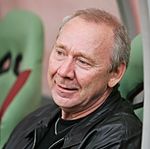
A Period Without Titles (2004–2016)
In 2004, Leonid Fedun became the club's President. Spartak finished second in the league in 2005, earning a spot in the Champions League. However, after a difficult start to the 2006 season, coach Aleksandrs Starkovs left.
In the 2012–13 season, Spartak played in the Champions League group stage but finished last. In the league, they finished fourth.
Since 2013, the club has added three more stars to its badge. This is because rules changed, allowing teams to include titles won during the Soviet era. The next three seasons (2013–14, 2014–15, 2015–16) saw Spartak finish in the middle of the league table and not qualify for European competitions.
Spartak's Comeback (2016–2022)
Before the 2016–17 season, Massimo Carrera, a former Juventus coach, took over. Spartak had many talented players, both foreign and Russian. They won the 2016–17 Russian Premier League title, their first in 16 years. They won most of their important derby matches and finished seven points ahead of the second-place team.
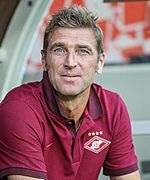
The next season, Spartak played in the 2017–18 UEFA Champions League group stage. They had a very big loss against Liverpool (7-0) but also achieved big wins, like 5-1 against Sevilla.
After finishing second in the 2020-21 Russian Premier League under coach Domenico Tedesco, Spartak had a great run in the 2021–22 UEFA Europa League. Led by Rui Vitoria, they won their group, beating strong teams like Napoli. They were supposed to play RB Leipzig, but all Russian clubs were suspended from international competitions.
On May 29, 2022, in the final match for coach Paolo Vanoli, Spartak won the 2021–22 Russian Cup.
New Owners (2022–Present)
On August 22, 2022, Lukoil Oil Company announced they had bought Spartak Moscow and its stadium. This happened after many changes at the club, including a new manager, Guille Abascal, who became the youngest manager in the club's history at 33 years old. Leonid Fedun, who had been president for over 18 years, resigned. Under his leadership, the club won one league title, one cup, and one supercup. They also built their own stadium for the first time.
In September 2022, Alexander Matytsyn from Lukoil became the new chairman of the board. In December 2023, the club announced it was bringing back its second team, which had been closed in 2022. This team will play in a lower league.
Club Achievements
National Competitions
- Soviet Top League/Russian Premier League
- Champions (22) (record): 1936 (autumn), 1938, 1939, 1952, 1953, 1956, 1958, 1962, 1969, 1979, 1987, 1989 / 1992, 1993, 1994, 1996, 1997, 1998, 1999, 2000, 2001, 2016–17
- Runners-up (18): 1937, 1954, 1955, 1963, 1968, 1974, 1980, 1981, 1983, 1984, 1985, 1991, 2005, 2006, 2007, 2009, 2011–12, 2020–21
- Soviet Cup/Russian Cup
- Winners (14) (record): 1938, 1939, 1946, 1947, 1950, 1958, 1963, 1965, 1971, 1992, 1993–94, 1997–98, 2002–03, 2021–22
- Runners-up (7): 1948, 1952, 1957, 1972, 1981, 1995–96, 2005–06
- Russian Super Cup
- Winners: 2017
- Runners-up (4): 2004, 2006, 2007, 2022
- Soviet First League
- Champions: 1977
- USSR Federation Cup
- Winners: 1987
International Competitions
- Commonwealth of Independent States Cup
- Winners (6): 1993, 1994, 1995, 1999, 2000, 2001
- Runners-up: 1997, 1998, 2002
Other Trophies
- Match Premier Cup
- Winners: 2019, 2020, 2021
- Ciutat de Barcelona Trophy
- Winners: 1982
- Copa del Sol
- Winners: 2012
European Matches
Spartak Moscow has played in many European tournaments. Here are some of their notable achievements:
| Season | Achievement | Notes | |
|---|---|---|---|
| European Cup / UEFA Champions League | |||
| 1980–81 | Quarter-final | lost to Real Madrid | |
| 1990–91 | Semi-final | lost to Marseille | |
| 1993–94 | Group stage | finished third in a group with Barcelona, AS Monaco and Galatasaray | |
| 1995–96 | Quarter-final | lost to Nantes | |
| 2000–01 | Second group stage | finished fourth in a group with Bayern Munich, Arsenal and Lyon | |
| UEFA Cup Winners' Cup | |||
| 1972–73 | Quarter-final | lost to Milan | |
| 1992–93 | Semi-final | lost to Antwerp | |
| UEFA Cup / UEFA Europa League | |||
| 1983–84 | Quarter-final | lost to Anderlecht | |
| 1997–98 | Semi-final | lost to Internazionale | |
| 2010–11 | Quarter-final | lost to Porto | |
Team Nicknames
The team is often called "red-and-whites" because of their colors. But fans also have a very popular nickname: "The Meat" (Мясо in Russian). This nickname comes from the club's early days. In the 1920s, the team changed names many times. For a long time, the team was supported by a Moscow food factory that made meat products.
One of the most popular chants among fans is: "Who are we? We're The Meat!"
Team Colors, Kits, and Badges
FC Spartak Moscow's main color is red. In 2014, Nike designed new kits inspired by the club's new home stadium.
Owners, Kit Suppliers, and Shirt Sponsors
| Period | Kit supplier | Shirt sponsor | Owner |
|---|---|---|---|
| 1979–1987 | Adidas | — | Spartak society |
| 1988 | Danieli | ||
| 1989 | JINDO | ||
| 1990–1993 | Unipack | ||
| 1994–1996 | Urengoygazprom | Oleg Romantsev | |
| 1997–1998 | Akai | ||
| 1999 | — | ||
| 2000–2002 | Lukoil | Andrey Chervichenko | |
| 2003–2004 | Umbro | Leonid Fedun | |
| 2005–2023 | Nike | ||
| 2023–2024 | Wildberries | Lukoil | |
| 2024–present | Jögel |
Rival Teams and Friendships
Spartak's biggest rival today is CSKA Moscow. This rivalry became very strong after the Soviet Union ended. Many of the most-watched matches in the Russian Premier League are between Spartak and CSKA.
Historically, Spartak's biggest rival was Dynamo Moscow. This is Russia's oldest football rivalry. Matches against Lokomotiv Moscow and Zenit Saint Petersburg are also very popular. After the Soviet Union broke up, Spartak's rivalry with Dynamo Kyiv (a top team from Ukraine) ended because they now play in different leagues.
Since the mid-2000s, Spartak fans have become friends with supporters of Crvena Zvezda (Red Star Belgrade) from Serbia and Olympiacos from Greece. This friendship is based on their shared Orthodox faith and similar club colors. Spartak fans also have friendly relationships with supporters of Torpedo Moscow and the Polish club Lech Poznań.
Home Stadium
For a long time, Spartak did not have its own stadium. The team played its home games at different stadiums in Moscow, like the Locomotiv and Luzhniki stadiums. There were plans to build a stadium in the early 2000s, but nothing happened.
When Leonid Fedun bought a large part of the club, he took real steps to build a stadium. In 2006, the city of Moscow gave land for the stadium. The plan included a main arena for 42,000 people. The first stone was laid on June 2, 2007.
In 2013, it was announced that the stadium would be called Otkritie Arena for six years because of a sponsorship deal. The first match at the new stadium was on September 5, 2014, when Spartak played a friendly game against Red Star Belgrade (1-1). The first official match was on September 14, 2014, where Spartak beat Torpedo Moscow 3–1.
Current Players
Team Roster
|
|
Players on Loan
|
|
Club Staff
- Owner:
 Vagit Alekperov,
Vagit Alekperov,  Leonid Fedun
Leonid Fedun - Managing Director:
 Yevgeni Melezhikov
Yevgeni Melezhikov - Director of Sports: Francis Cagigao
- Caretaker head coach:
 Vladimir Slišković
Vladimir Slišković - Assistant coach:
 Carlos Valle
Carlos Valle - Goalkeeping coach:
 Vasili Kuznetsov
Vasili Kuznetsov - Physical coach:
 Fernando Perez Lopez
Fernando Perez Lopez - Reserves team head coach:
 Aleksei Lunin
Aleksei Lunin - Reserves team assistant coach:
 Aleksei Melyoshin
Aleksei Melyoshin - Reserves team goalkeeping coach:
 Vasili Kuznetsov
Vasili Kuznetsov
See also
 In Spanish: F. C. Spartak de Moscú para niños
In Spanish: F. C. Spartak de Moscú para niños
 | Sharif Bey |
 | Hale Woodruff |
 | Richmond Barthé |
 | Purvis Young |


